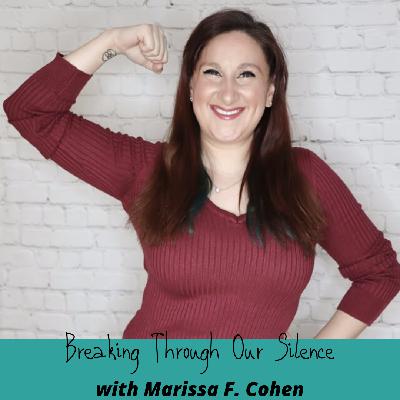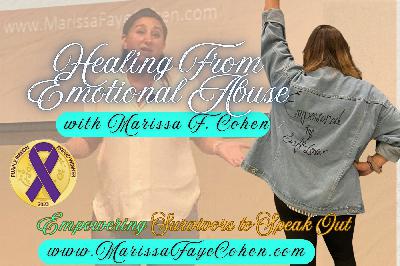Anne Catona Lynn survived a traumatic car accident at age 4, multiple sexual assaults in her 20s, and decades of unprocessed PTSD—until she discovered EMDR therapy and began her healing journey. Now a trauma-informed consultant and author, Anne shares her transformative story and the specific techniques that helped her reclaim her life.
Discover how childhood trauma affects physical health, why self-medication fails, and the surprising connection between adverse childhood experiences and autoimmune diseases. Learn practical, actionable strategies you can implement today to regulate your nervous system and begin healing.
Anne also discusses her groundbreaking work building trauma-sensitive, resilient schools and communities—and how the same principles that heal individuals can heal entire organizations.
Topics covered:
EMDR (Eye Movement Desensitization & Reprocessing) therapy breakthrough
Childhood trauma and PTSD recovery
Sexual assault healing and shame
Mind-body connection: trauma and autoimmune disease
Practical grounding exercises for nervous system regulation
Reframing trauma narratives from shame to strength
Building trauma-informed schools and communities
Holistic healing: nutrition, movement, mindfulness
When to seek professional help and therapy
Resources mentioned:
"Shedding Lies: Living Beyond Childhood Trauma" (available on Amazon, Kindle on sale for 99¢)
"Depression Lied to Me" (anthology featuring Anne's story)
Upcoming book: "Grief, Grace, and Gravity" (with her husband)
Website: KatonLynnConsulting.com
Keywords: trauma recovery, EMDR therapy, childhood PTSD, sexual assault healing, nervous system regulation, autoimmune disease, trauma-informed schools, healing strategies, adverse childhood experiences, mental health
Transcript:
📍 📍 Welcome to Healing From Emotional Abuse, the award-winning podcast that sheds light on the journey from victim to survivor. I'm your host Marissa f Cohen, and I'm thrilled to have you join us on this empowering and healing adventure, the Healing from Emotional Abuse podcast. Isn't just another conversation.
It's a sanctuary for those who have endured abuse and are determined to reclaim their lives. Through interviews with inspiring survivors, experts, and advocates, we aim to break the silence surrounding abuse and empower our listeners with the knowledge. Support and resources they need to break free from their past.
Our mission is to provide a safe space where survivors can share their stories, find solace in knowing they're not alone, and discover the strength within themselves to heal and thrive. Each episode is filled with powerful narratives, practical strategies, and compassionate guidance to help you overcome the lingering effects of abuse and build a brighter future.
It brings me immense joy to announce that the Healing from Emotional Abuse Podcast has been honored with the prestigious Purple Ribbon Award for outstanding domestic violence podcasts by domestic shelters.org, recognizing our commitment to raising awareness about abuse. And offering hope to survivors worldwide.
We have hit top 10% globally and top podcast in 25 countries. This accolade is a testament to the incredible guests who have shared their stories and the tremendous support from our devoted listeners. Thank you so, so much. Whether you're a survivor seeking healing, a friend or family member wanting to understand and support, or an advocate dedicated to creating a safer world, this podcast is for you.
Our conversations delve into topics such as emotional, physical, financial, and psychological abuse, recovery techniques, self-care strategies. Legal rights and much, much more. Join us as we embark on this transformative journey together. Subscribe to healing from emotional abuse on your favorite podcast platform.
And remember, your story matters, and you have the power to break your silence from the chains of abuse. I'm your host, Marissa f Cohen, and this is healing from emotional abuse. Let's reclaim our lives and empower one another.
📍 📍 All right. Welcome back to The Healing From Emotional Abuse Podcast. I'm your host, Marissa f Cohen, and today we're joined with Anne Catona Lynn, who is an incredible survivor. She also is a coach, um, an author of a couple books and a consultant. So, uh, consultant, coach, and author. I'm sorry, author and speaker, empowering community leaders.
To build safe, supportive schools through authentic engagement, um, and helps communities unite to prevent problem behaviors, crises, and improve school culture. She's the author of Shedding Lies, sharing my Journey, sharing her journey, overcoming Childhood Trauma, and she likes to advocate for younger adults with mental health and substance use disorders.
So welcome on. Anne, thank you so much for being here today. Thanks so much for having me. I'm really great. I'm really excited to be here. Oh my gosh. I'm so excited to have you. So tell us a little bit about yourself. I read your bio, um, but I wanna hear it from you. Yeah. Um, so. Um, you know, again, I, I, I do this work and it really came out of my childhood trauma.
So I, um, I had an accident when I was four and, um, I was, um, it was a car accident and I went face first through the windshield and I remember all of those things. And, uh, at the time, they wouldn't allow families to stay with you in the hospital. And so I was in the hospital by myself and again, remember all of it.
I'm 57 now, so this was 53 years ago and I remember everything and it, they further traumatized us. So it was, I had full blown PTSD. Then when I got home it was 1970, we didn't talk about stuff. We still, in so many ways, especially kids, we're like, oh, if they don't, we don't see any big issues. Let's not talk about it.
And, and the mistake was I was really struggling. I just, it wasn't as outward as much as it, you know, it could have possibly been, but there were a lot of things I was hiding and didn't know that that's what I was doing. Again, it was just my coping strategies and so. That really set the stage for the work that I do.
Um, you know, again, childhood trauma, I had full-blown PTSD. I started drinking in my at 14 'cause it's socially acceptable and it's really kind of, you know, we would go out to Bush parties and, you know, get a keg of beer and that's what we did. It was not a big deal. And so it was kind of like a cool rite of passage.
And, um, so I, but what I, what I realized then was that my PTSD was kind of. Being self-medicated by the drinking. And I was al, I've always spent most of my life trying to prove myself and, uh, you know, just trying to kind of put on a good face, like everything is wonderful. None of the, you know, and, and so everything that I learned as a child was kind of what I did.
And so. That really, um, set the stage for just more self-medication. You know, again, a lot of times we think of self-medication as something like alcohol or, you know, drugs or anything, which, yes, it's true. I also, you know, uh, good things can be self-medication. So for me too, I was so insecure. Uh, I'm the youngest of seven and I really.
I didn't feel that I, you know, I didn't have a, my, my family was busy and my parents were both working, so I didn't get a whole lot of attention. I was kind of passed around and again, didn't really realize the impact that that had on me. But my self-esteem was really low. Uh, and I got into relationships with guys that weren't really good for me because.
I was looking for love and you know, like the song, looking for love in all the wrong places. And unfortunately, you know, um, in my early twenties, uh, I just had ex, I had, I had experienced being sexually assaulted by two different guys that I was, that I knew. And one of them I previously dated. So, um, that further added trauma and, um, you know, the first one, like I said, it was a guy that I had dated and so we had sexual relations and, um, this, this happened after we had broken up.
And he came to my apartment on a Saturday night and it was, you know, uh, my, I was sleeping and it, it was, he rang the doorbell and, and I'm like, you know, what do you want? I'm sleeping. And he said, I just really wanna talk to you. And I'm like, okay. 'cause I couldn't, there's like an extra layer of security and I couldn't see that he had someone else with him.
And so, um, if I would, I would've not let him in for sure. And. Um, so anyway, let him in. And he pushed in through the door. 'cause you know, when I saw the other person with him, it was his cousin. I didn't want him to come in just 'cause I was like, what's going on? What do you, why you're here. And, um. I just wanted to go to sleep.
So anyway, when they came in, he just, um, forced himself on me. And, uh, I didn't realize what happened. My body kind of just shut down and really disconnected from my, you know, my brain. My brain disconnected from my body. And um, and then like three days later I was out with some friends and we were at a bar and all of a sudden I had a panic attack and I realized that, I'm like, oh my gosh, I was raped.
So I filed a police report. I didn't press charges. 'cause again, there's so much shame and blame that you put on yourself. And that was, um, you know, not only had I already had so much of that being a woman in the seventies and I. You know, kind of again, being the youngest and, um, feeling that I, I, I was sort of, I, I wasn't expected.
I have six siblings and eight years, and I'm eight years younger than them, so it was like an oops. And, um, you know, so I didn't, I, I just, uh, really did not feel like I was, um. I felt like I was a pain in the butt all the time, so I always felt like I was a bother. So that's why I really, I couldn't imagine, and I, you know, I was also across the country.
I was gonna school in San Francisco. My family's on the East coast, and I, I just couldn't even imagine going through a court trial of. Having to press charges and, and,









You are amazing ❤️❤️❤️❤️